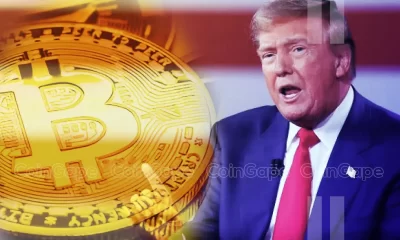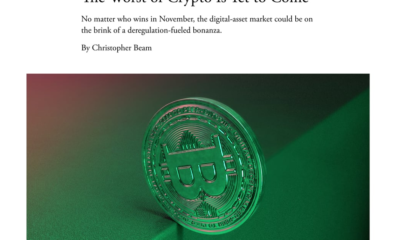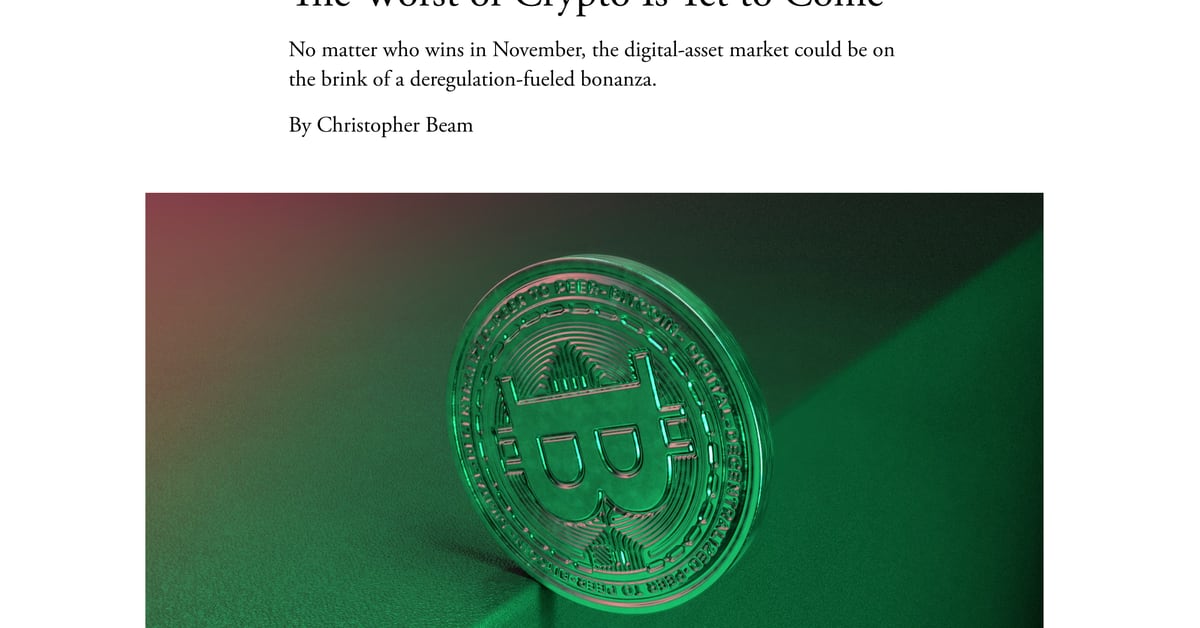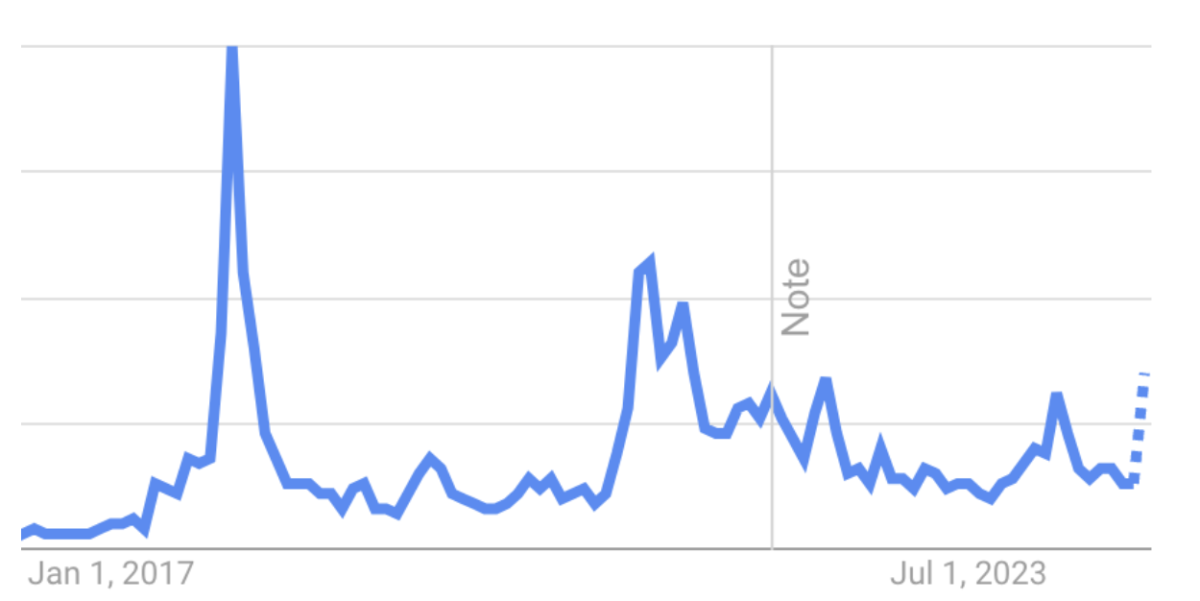Opinion
A Kamala Presidency Could Be Just as Bullish for Bitcoin
Published
1 month agoon
By
admin
Yes, I know, you’re here to let the hate flow.

You’ve bought all the rhetoric. Donald Trump likes crypto. He is embracing DeFi. He has his own shoes, and coins. He’s going to fire Gary! Like Polymarket in October, you think Trump is boo-llish.
Unfortunately, you’ve bought a lot of another kind of bull.
To unpack this, we have to understand what the Crypto 4 Trump initiative really is – and that’s an alliance of largely public U.S.-based mining firms and exchanges that have come together to spend aggressively to end their mistreatment.
They are tired of being sued and harassed, and otherwise chased out of America. As well, they have every reason to be.
But alas, the industry Bitcoin is not. This was the same argument made to justify the Fork Wars, and let’s just say for summation, that this ended terribly. If U.S. miners are forced elsewhere, mining will continue elsewhere, and decentralizing the hashrate, as we saw in the case of China’s mining ban, is quite simply: Good For Bitcoin™.
Sure, ASIC manufacturing may remain consolidated in a few international firms. Maybe it will take even longer to rebuild. But other countries will take advantage, and the Bitcoin network will carry on. Bitcoin may be our best opportunity to topple all of the current superpowers, and to empower the developing world. If that means leaving the U.S. behind, so be it.
Now let’s address the donkey in the room. A Kamala presidency will mean more enforcement of U.S. securities laws, not a referendum that allows millions of alts to proliferate.
A Trump victory almost certainly ensures only one outcome for our industry, and that is that the SEC gets defanged, and that means “coins beyond Bitcoin” will get a “level playing field.”
By contrast, continued enforcement of the SEC’s securities laws on the industry will rightfully make clear the difference between Bitcoin, which was distributed via proof-of-work (the only known way to circumvent securities sales), and all of the many centralized variants.
Simply put: It’s “crypto assets” that require a regulatory framework to survive, not Bitcoin, which is sufficiently decentralized.
Forcing the crypto industry’s builders to abide by these laws will doubtless benefit developers seeking to extend these capabilities to Bitcoin, the only major crypto with regulatory clarity. Are we actually going to argue that encouraging millions of developers to put their technology on Bitcoin (as opposed to Ethereum or Solana) would be a bad thing?
If there is a coherent thread to Bitcoin maximalism, it’s the assertion that everything outside of Bitcoin is either 1) a scam or 2) can be built on top of its blockchain. A continued crackdown on crypto will push the market to more thoroughly investigate the second point.
Undoubtedly, it would also boost Microstrategy’s stock, MSTR, as it would remain one of the few widely accessible plays to get legitimate beta on Bitcoin.
Sure, maybe the taxes from your Bitcoin gains will be higher, maybe spending will continue to be penalized. But anon, I thought you were HODLing anyway?
So, remind me, of all the supposed pro-Bitcoin policies of a Trump presidency, what is it that you expect to get, other than state-sanctioned degeneracy and block propagation in the heartland?
If you’re a single issue Bitcoin voter, shouldn’t that mean voting for an option that makes Bitcoin more decentralized, and less reliant on U.S. government policy?
Allow me to reintroduce you to Madame President Harris, a bullish choice for Bitcoin.
This article is a Take. Opinions expressed are entirely the author’s and do not necessarily reflect those of BTC Inc or Bitcoin Magazine.
Source link
You may like


Know Your Missiles: Russia’s Experimental Hypersonic Missile Is A New Kind of Killing Machine


Polkadot investor predicts a 30,000% rally for this $0.04 token by 2025


Donald Trump Proposed Crypto Advisory Council To Set Up Strategic Bitcoin Reserve


Want Greater Bitcoin Adoption? Engage With Your Government.


Why the Media Loves the Worst of Crypto


HashCats prepares for Token Generation Event after completing mining season
Bitcoin Policy
Want Greater Bitcoin Adoption? Engage With Your Government.
Published
4 hours agoon
November 21, 2024By
admin

It’s been a good week for Bitcoin and its status in the eyes of federal deposit insurance corporations. (Well, there’s a weird sentence I never thought I’d write.)
On Tuesday, the anti-crypto U.S. Federal Deposit Insurance Corporation (FDIC) Chairman, Martin Gruenberg, announced he’d be stepping down in January.
And yesterday, Heritage Falodun, CEO of DigiOats, Nigeria’s leading Bitcoin education and consultancy platform, educated members of the Nigeria Deposit Insurance Corporation (NDIC) about the benefits of bitcoin and other digital assets.
Falodun, an indefatigable Bitcoin proponent, spearheaded a seminar for the NDIC entitled “Cryptocurrency in the Evolving Financial Industry”.
This week, @DigiOats alongside with #MassCyberTech completed a groundbreaking seminar for @NDICNigeria 🇳🇬on “Cryptocurrency in the Evolving Financial Industry”. We explored #Bitcoin adoption, regulation, and sustainable finance marking a key moment for Nigeria’s financial future pic.twitter.com/hpWQOqZt8L
— DigiOats⚡️ (@DigiOats) November 21, 2024
In it, he highlighted the following points:
- Bitcoin can serve as a reserve asset for nation states, including Nigeria
- Using bitcoin (and other digital assets), banks can reduce settlement time
- Bitcoin can reduce capital controls, as its censorship resistant
Falodun and his team also provided an overview on the evolution of money and financial systems and also touched on the ways in which bitcoin and crypto are already integrated into traditional financial structures in efforts to convince the NDIC of Bitcoin and crypto’s importance.
“Nigeria must adopt balanced regulations that protect citizens and foster innovation,” Falodun told Bitcoin Magazine. “By embracing Bitcoin’s uniqueness and engaging the Bitcoin community, Nigeria can lead the global financial revolution.”
Falodun knows that without properly educating government officials, Bitcoin runs the risk of being misunderstood and, therefore, regulated improperly.
“I would like regulators to understand that Bitcoin’s decentralized nature is not a flaw to be regulated out of existence, but a feature that offers unprecedented opportunities for inclusion, economic freedom and optimization of financial rails,” he added.
I respect Falodun’s efforts.
Before you go calling me a statist or some other silly reductive term, I’d like to remind you that even well-known cypherpunks like Adam Back have said that part of the struggle around greater Bitcoin adoption (and encryption in general) will include engaging with governments (and courts).
Proponents of Bitcoin should acknowledge our current political reality and make the case for Bitcoin to those in power if they want to see it flourish — or if they want to at least stop governments from crafting poor policy around Bitcoin and/or attacking the industry.
Take a cue from Falodun and do your part to educate local government officials, members of state-level administrative agencies or even Federal-level bureaucrats about Bitcoin.
It’s one of the most important things you can do to keep your country from falling behind.
Source link


Not all crypto projects have clear value, however. Memecoins, digital tokens whose value is driven by internet attention rather than tangible use, are divisive — even within crypto circles. For example, dogecoin, a favorite of Elon Musk, has a market value exceeding 94% of companies in the S&P 500, despite lacking a product or business model. Recently, Chris Dixon, at Andreessen Horowitz, even criticized memecoins’ as undermining understanding of the sector’s utility. If one was looking for a reason to argue crypto is a scam, you could find it in pockets of the memecoin world.
Source link
Markets
The Chart That Shows Bitcoin’s Bull Run Won’t Stop at $100,000
Published
8 hours agoon
November 21, 2024By
admin
Peak Bitcoin, hardly.

https://x.com/pete_rizzo_/
As I wrote in Forbes in 2021, the world is waking up to a new reality in regards to Bitcoin – the unlikely truth that Bitcoin’s programming has cyclical effects on its economy.
This has led to at least 4 distinct market cycles where Bitcoin has been branded a bubble, skeptics have rung their hands, and each time, Bitcoin recovers more or less 4 years later to set new all-time highs above its previously “sky-high” valuation.
I personally watched Bitcoin go from $50 to $1,300 in 2013. Then, from $1,000 to $20,000 in 2017, and I watched it go from $20,000 to $70,000 in 2021.
So, I’m just here to relate that, from my past experience, this market cycle is just heating up.
For those who have been in Bitcoin, there’s one tried-and-true and that’s Google Search. As long as I’ve been in Bitcoin, this has been the best indicator of the strength of the market.
Search is low, you’re probably in a bear market. Search heading back to all-time highs? This means new entrants are getting engaged, learning about Bitcoin, and becoming active buyers.
Remember, this is a habit change. Bitcoin HODLers are slowing shifting their assets to a wholly new economy. So, Google Trends search then, represents a snapshot of Bitcoin’s immigration. It shows how many new sovereign citizens are moving their money here.

And it’s something that all who are worried about whether bitcoin’s price topping out in 2024 should pay attention to.
Last year was the Bitcoin halving, and historically, the year following previous halvings has led to price appreciation. Maybe you’re tempted to think, “this time is different” – not me. I look at search and I see a chart that continues to accelerate into price discovery. Trust me when I say no one I know is selling bitcoin.
As shown above, buyer interest is accelerating, and these new buyers have to buy that Bitcoin from somewhere. Add nation states, US states, and a coming Trump administration set to ease the burden on the industry?
Well, I think the chart above says it all really.
This article is a Take. Opinions expressed are entirely the author’s and do not necessarily reflect those of BTC Inc or Bitcoin Magazine.
Source link

Know Your Missiles: Russia’s Experimental Hypersonic Missile Is A New Kind of Killing Machine

Polkadot investor predicts a 30,000% rally for this $0.04 token by 2025

Donald Trump Proposed Crypto Advisory Council To Set Up Strategic Bitcoin Reserve

Want Greater Bitcoin Adoption? Engage With Your Government.

Why the Media Loves the Worst of Crypto

HashCats prepares for Token Generation Event after completing mining season

Gary Gensler To Step Down As US SEC Chair In January

The Chart That Shows Bitcoin’s Bull Run Won’t Stop at $100,000

$2 Million PEPE Purchase Sees 105 Billion Tokens Snapped Up

XRP price expected to reach $7, Dogecoin $3, and PCHAIN $1 from $0.004

Bitcoin Miner MARA Holdings Raises $1B To Buy More Bitcoin

Sui Network blockchain down for more than two hours

Analyst Says Six-Figure Bitcoin Price Incoming – But Warns One Factor Could Delay BTC Rally Till Next Year

How Will BTC React to $3B Buying Spree?

ECB official calls for urgency on digital euro amid global CBDC race
182267361726451435

Top Crypto News Headlines of The Week

Why Did Trump Change His Mind on Bitcoin?

New U.S. president must bring clarity to crypto regulation, analyst says

Ethereum, Solana touch key levels as Bitcoin spikes

Bitcoin Open-Source Development Takes The Stage In Nashville

Will XRP Price Defend $0.5 Support If SEC Decides to Appeal?

Bitcoin 20% Surge In 3 Weeks Teases Record-Breaking Potential

Ethereum Crash A Buying Opportunity? This Whale Thinks So

Shiba Inu Price Slips 4% as 3500% Burn Rate Surge Fails to Halt Correction

‘Hamster Kombat’ Airdrop Delayed as Pre-Market Trading for Telegram Game Expands

Washington financial watchdog warns of scam involving fake crypto ‘professors’

Citigroup Executive Steps Down To Explore Crypto
Mostbet Güvenilir Mi – Casino Bonus 2024

Bitcoin flashes indicator that often precedes higher prices: CryptoQuant
Trending

 2 months ago
2 months ago182267361726451435

 24/7 Cryptocurrency News3 months ago
24/7 Cryptocurrency News3 months agoTop Crypto News Headlines of The Week

 Donald Trump4 months ago
Donald Trump4 months agoWhy Did Trump Change His Mind on Bitcoin?

 News3 months ago
News3 months agoNew U.S. president must bring clarity to crypto regulation, analyst says

 Bitcoin4 months ago
Bitcoin4 months agoEthereum, Solana touch key levels as Bitcoin spikes

 Opinion4 months ago
Opinion4 months agoBitcoin Open-Source Development Takes The Stage In Nashville

 Price analysis3 months ago
Price analysis3 months agoWill XRP Price Defend $0.5 Support If SEC Decides to Appeal?

 Bitcoin4 months ago
Bitcoin4 months agoBitcoin 20% Surge In 3 Weeks Teases Record-Breaking Potential


